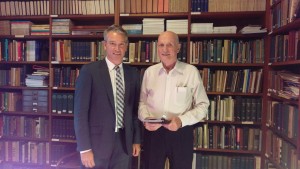America, the angry
At a crowded meeting at Glover Cottages on Tuesday 1 March, Tom Switzer added to the enthusiasm and humidity with a closely-argued address on the presidential race. He began with a confession: he had ‘mis-underestimated’ Donald Trump. But every time Trump oversteps the mark – on Mexicans being rapists and drug dealers, on John McCain not being a war hero because he was captured, on Fox News anchor Megyn Kelly asking tough questions because she was menstruating, on banning Muslims from entering the United States, on shooting someone in downtown New York without losing votes – Trump is not mugged by political reality, but surges in the polls. His spray is not limited to lefties. George W. Bush had lied about WMDs, and had made a ‘big fat mistake’ in invading Iraq. Trump attacks conservative publications like the Wall Street Journal and National Review. His remarks make him impervious, and he could win in November. Even if he doesn’t, he could split the Republican Party, demoralise the conservative movement, alienate independents and unite Democrats behind a flawed candidate, allowing them a third term in the White House for the first time since the 1940s.
Why is Trump so successful? Because, Tom suggests, we are living in the year of the outsider, the most volatile and unpredictable in living memory. Significant segments of white and blue collar Americans are in a foul mood. They hold right-wing views on race, crime and poverty, and left-wing views on big business, income inequality and government pensions. They fear the decline of the United States. They hate the Washington establishment for weakening border protection, preaching political correctness, negotiating trade deals that lose Americans jobs, and plunging the country into Mesopotamian misadventures while allowing barbarians like Islamic State to threaten Californians. They lack faith in their leaders. Trump represents someone through whom they can vent their fury at the beltway ruling class of pollies and serves. They want someone who can go to Washington and knock heads together.
It is also why, on the other side of the fence, Tom asserts, Bernie Sanders has given Hillary Clinton a real run for her money, another surprise to political observers. Bernie is a socialist who honeymooned in the Soviet Union and wanted to scrap the CIA as a tool of corporate interests, and now wants to make college and child care universal government-subsidised entitlements, double the basic wage and control the banks. Some of these may seem reasonable to Australians, but this is the United States, where the centre of political gravity is well to the ideological right of the rest of the world. In the 1950s and 60s Bernie Sanders would have been strung up by Senator Jo McCarthy as a Communist, but is nowadays regarded by many disaffected voters as their saviour. So Hillary has had to lurch to the left to contain him.
Tom said that although the Europeans are not cursed with exceptionalist delusions like Americans, many Europeans harbour similar anger against their governments. From France to Finland, Poland to Hungary, Spain to Greece, insurgent forces, both Right and Left, are dismantling established parties. Trump echoes Matrine Le Pen and Beppe Grillo, and Sanders the socialist movements in Greece and Spain. According to Tom, and this is his conclusion, history has left American exceptionalism behind. The US has lost its pre-eminence, and its military might alone will not get it back. So anger and anxiety will continue to characterise US politics for a long time to come.
Report prepared by Richard Broinowski
